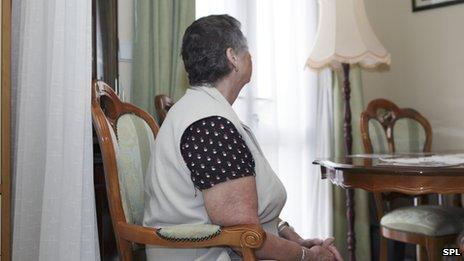Why retirement can be bad for your health
-
Published

Loneliness is a key cause of mental health problems in retired people
Retirement is often seen as a time when people can kick back and enjoy holidays or hobbies they haven't been able to indulge in during their working lives.
But research from the Institute of Economic Affairs suggests that while retirement may initially benefit health - by reducing stress and creating time for other activities, adverse effects increase the longer retirement goes on.
It found retirement increases the chances of suffering from clinical depression by around 40%, and of having at least one diagnosed physical illness by 60%.
So why can retirement be bad for your health?
LONELINESS
There are two stereotypical images of elderly people. One is the active golf club member, allotment-keeper or busy grandparent.
Keeping active is good for body and soul
The other is the lone pensioner, huddled in a chair by the fire trying to keep warm while using as little heating as possible who doesn't see anyone for days on end.
When someone's social life was tied up with their work, retirement can take it all away.
Mental health problems are common.
One in five experiences depression, according to the Mental Health Foundation.
Those living alone because of bereavement or divorce are more at risk, it says.
Physical health problems can also make people more vulnerable to mental health issues.
IMMOBILITY AND INACTIVITY
It may be there is no imperative to get up and out of the house, as there was when there was a daily journey to work.
Or it may be that a health problem has meant someone cannot - or does not want to - get out and about.
But experts are agreed that being active is good for you on many levels.
Age UK runs a programme called Fit as a Fiddle, which encourages older people to keep physically active - as well as to eat healthily and look after their mental health.
Simply walking can offer great benefits, including boosting your mood, as can gentle exercise classes.
However, the IEA - along with the Age Endeavour Fellowship which co-authored the report - says one answer would be to allow people to keep on working for longer, in order to help people live healthier lives.
AGE
Put simply, retirement happens when you are old.
And being old means that lifestyle choices catch up with you.
A lifetime of smoking, a poor diet or drinking too much alcohol will all have had an effect.
They can result in cardiovascular problems, respiratory disorders like COPD (chronic obstructive pulmonary disease) or complications of type 2 diabetes which can all affect a person's ability to be as active as they would like.
Cancer is also predominantly a disease of old age. Three out of five cancers occur in people aged 65 and over, while more than a third are diagnosed in the over-75s.
And dementia is obviously a condition which affects elderly people.
These are just some of the conditions which are more likely to affect older people - and which can therefore affect retirement.
-
-
Published16 May 2013
-
-
-
Published23 February 2013
-
-
-
Published18 November 2012
-
-
-
Published30 April 2013
-